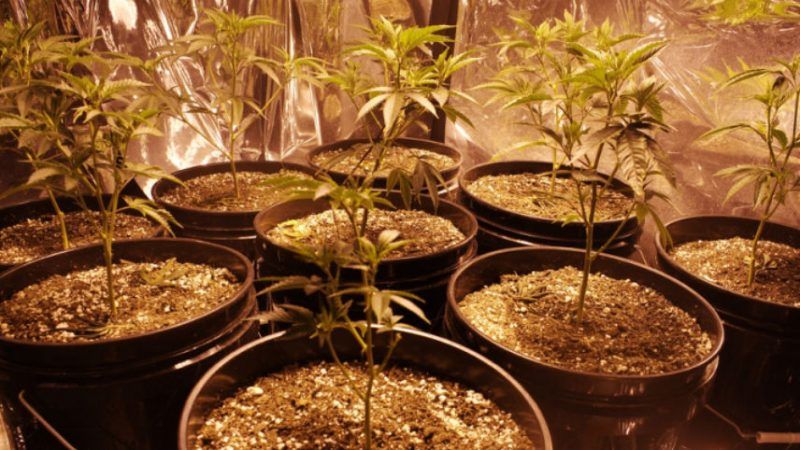Despite Being Heavy-Handed, California Marijuana Rules Signal End of Prohibition
It's happening.

It's an old cliché, but one doesn't find beer distributors gunning each other down in the town square in battles over market turf. Whisky distillers don't dump pollutants in streams and rivers—and bars and restaurants that serve cocktails tend to be safe places that follow modern building codes. People rarely go blind drinking hooch that some disreputable "distiller" made in a bathtub.
Alcoholism causes terrible problems, but since the end of Prohibition Americans have made their peace with booze. It's been harder convincing policy makers to take a similar approach with marijuana, even though the War on Drugs has left a trail of destruction that's as troubling as the ill it seeks to combat. Conservative icon William F. Buckley warned years ago about the toll that war would take on civil liberties and budgets, but few heeded his warnings. When will politicians learn?
Fortunately, voters are learning that the relatively benign drug of marijuana is best dealt with using a tax-and-regulatory approach rather than SWAT teams and prosecutions. The federal government is behind the times, of course, with Attorney General Jeff Sessions blathering about weed in a way that would make members of the Woman's Christian Temperance Union proud, if there were indeed still members of that group.
Californians voted last November by a 14-point margin to legalize recreational uses of marijuana. It wasn't that controversial, having the backing of the California Medical Association, Lt. Gov. Gavin Newsom (D) and Republican Congressman Dana Rohrabacher of Huntington Beach. California is one of several states that legalize recreational use. Twenty-nine states plus the District of Columbia legalize weed in some form. Even Arkansas passed a medical-marijuana measure.
It's been a long process watching this illicit industry morph into a legal one, which should be a wakeup call for those who think that one year into any presidency is going to lead to any serious swamp-draining in any area of public life. Regulatory rollbacks can take a very long time. Sadly, the marijuana legalization process has been excruciatingly slow given that marijuana use wasn't particularly taboo even when I was in high school 40 years ago.
It's been more than 20 years since Californians voted to legalize medical marijuana with the passage of Proposition 215. That was a good idea even though it created bizarre scenarios. It's widely known that one need only claim "anxiety" to get a prescription, which then opens the door to products sold at dispensaries. That never really bothered me. If it weren't for regulatory workarounds, there would be far fewer freedoms in this country.
But it wasn't until last year that the California legislature finally got around to establishing rules for dispensaries that were operating in a legal gray area since 1996. Again, the voters led the way. When it seemed obvious that Proposition 64, the recreational legalization measure, would be on the November 2016 ballot, legislators realized they finally needed to clarify the legal framework for medical marijuana, because that would become the template for recreational sales.
And now, with legal sales of recreational products coming online, the state government just issued 276 pages of regulations to deal with the budding weed market. This is California, so the tax bite will be steep—and the rules govern every aspect of marijuana's sale and delivery.
Adults may purchase up to an ounce of marijuana. Weed may not be delivered via drone or bicycle and must be tested for various chemicals, according to news reports. There are limits on additives such as caffeine and THC (the high-causing compound) levels in edibles. Many rules are perfectly reasonable, but there's a current debate over the size of allowable marijuana grows. Some state officials are upset that the new regulations don't limit the size of marijuana farms.
Local governments are wrestling with limits and even bans on marijuana sales, which shouldn't be a surprise given that cities still regulate and debate the number and locations of liquor stores and tobacco sellers. Police worry that illegal grows may continue given that marijuana is still illegal elsewhere—and California could be a source of illegal exports.
Before the initiative passed, I wrote about longtime marijuana activists who opposed legalization efforts. Some did so because they feared that the new highly regulated and taxed regimen would be too heavy-handed and oppressive. Some attitudes may reflect an old saying about the "Baptists and the Bootleggers" who united to support Prohibition—the first for moral reasons, the second to protect their established market share.
The debates often overlook an obvious fact. Marijuana isn't called weed for nothing—it grows easily and is widely available, legal or not. For all the flaws in the state's evolving legalization process, it's still better than the Prohibitionist alternative. Maybe one day soon, marijuana businesses will be totally mainstream—and will be stuck complaining about high taxes and overregulation like the rest of us.
This column was first published in the Orange County Register.


Show Comments (24)